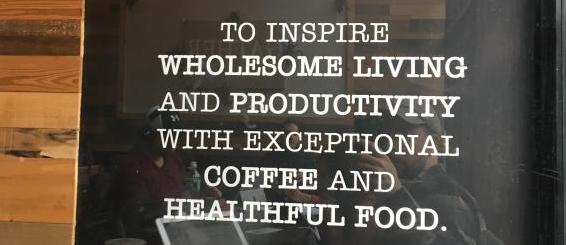I’m sitting in a Brooklyn coffee shop today. It is a typical place. Trendy; busy. Chalkboard paint on the walls. Wood paneling. On the wall right by the entrance, however, there is something you don’t see all the time. Their mission statement.

Missions statements are rarely something we get excited about. This is for good reason. We have neutered them, taken away their power. But, there is a potential lurking in the mission statement, an opportunity that can transform organizations and individuals.
The Game
It’s not incredibly rare to be exposed to a mission statement. If you’re anything like me, most mission statements feel like shams. It feels like I am being manipulated, that they were decided upon in a board room with the intention of attracting customers. The real mission is making money, right? A mission statement is just something an organization does to justify their business. I wonder if the employees in this coffee shop know it? Even when it is written on their wall. Does it truly describe their mission or is it just fluff?
Regardless, does it have to be this way? Do mission statements have to be manipulative, false, drivel that is just another layer of forged exchange between company and customer? Maybe there is a better way.
The Opportunity
The truth is this: business was invented to help people. Within a community, needs arise. And in exchange for finding the resources, knowledge, and skills to meet those needs, the community resources the provider to live their life. It is an exchange. A transaction.
The problem is that we are constantly at odds, trying to get the better end of the deal. We have put ourselves in opposition, unnecessarily.
A mission statement can be an opportunity to communicate the values and purpose of an organization. To say to people, this is what matters to us and why we exist. People, after all, buy the Why much more than the What.

However, it can’t just be about attracting customers. It has to be true. An organization, or person, would need to really look into the why, to name it and own it accurately.
No one is in business to make money. It might feel like the truth, but it isn’t. The truth is actually much worse. We’re in business for validation, power, control. Not an enticing mission statement.
But even power and control are not our deepest longings. They are still not the truest of the truth. We want power for a reason – usually something along the lines of wanting to be loved or valued. In this way, the business we have chosen is likely related to a field that holds deep value for us, makes us come alive.
In the original sense of the arrangement, what you love and are good at is not yours alone. It belongs to the community for the edification of all in the community. This is the true intersection of the mission statement – where the purpose you were created for collides with the needs of the community.
This is the lost potential of the mission statement. What if every organization, family, individual, and team named what truly matters to them. The real why. The deep reason? What if it wasn’t just something we plastered on walls or sold in brochures? What if we truly believed our purpose was good, unique to who we are, and valuable to the community?
Maybe this coffee shop is doing this and maybe they aren’t. It’s hard to tell just by the words on the wall. A mission statement is either a sentence or a cultural standard. The choice of how to utilize it is a decision each of us must make.












